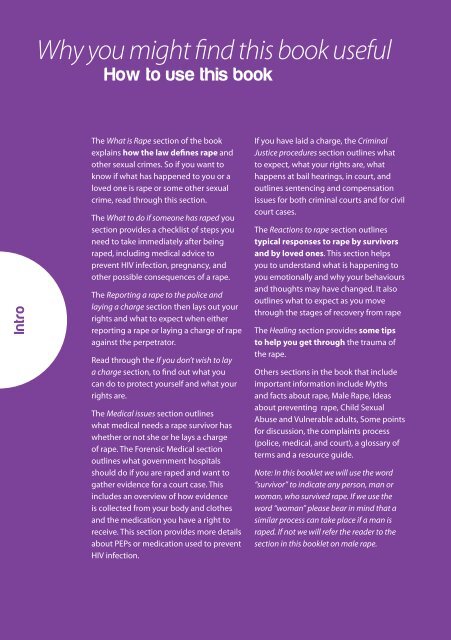Subtitle? - Rape Crisis
Subtitle? - Rape Crisis
Subtitle? - Rape Crisis
Create successful ePaper yourself
Turn your PDF publications into a flip-book with our unique Google optimized e-Paper software.
Why you might find this book useful<br />
How to use this book<br />
Intro<br />
The What is <strong>Rape</strong> section of the book<br />
explains how the law defines rape and<br />
other sexual crimes. So if you want to<br />
know if what has happened to you or a<br />
loved one is rape or some other sexual<br />
crime, read through this section.<br />
The What to do if someone has raped you<br />
section provides a checklist of steps you<br />
need to take immediately after being<br />
raped, including medical advice to<br />
prevent HIV infection, pregnancy, and<br />
other possible consequences of a rape.<br />
The Reporting a rape to the police and<br />
laying a charge section then lays out your<br />
rights and what to expect when either<br />
reporting a rape or laying a charge of rape<br />
against the perpetrator.<br />
Read through the If you don’t wish to lay<br />
a charge section, to find out what you<br />
can do to protect yourself and what your<br />
rights are.<br />
The Medical issues section outlines<br />
what medical needs a rape survivor has<br />
whether or not she or he lays a charge<br />
of rape. The Forensic Medical section<br />
outlines what government hospitals<br />
should do if you are raped and want to<br />
gather evidence for a court case. This<br />
includes an overview of how evidence<br />
is collected from your body and clothes<br />
and the medication you have a right to<br />
receive. This section provides more details<br />
about PEPs or medication used to prevent<br />
HIV infection.<br />
If you have laid a charge, the Criminal<br />
Justice procedures section outlines what<br />
to expect, what your rights are, what<br />
happens at bail hearings, in court, and<br />
outlines sentencing and compensation<br />
issues for both criminal courts and for civil<br />
court cases.<br />
The Reactions to rape section outlines<br />
typical responses to rape by survivors<br />
and by loved ones. This section helps<br />
you to understand what is happening to<br />
you emotionally and why your behaviours<br />
and thoughts may have changed. It also<br />
outlines what to expect as you move<br />
through the stages of recovery from rape<br />
The Healing section provides some tips<br />
to help you get through the trauma of<br />
the rape.<br />
Others sections in the book that include<br />
important information include Myths<br />
and facts about rape, Male <strong>Rape</strong>, Ideas<br />
about preventing rape, Child Sexual<br />
Abuse and Vulnerable adults, Some points<br />
for discussion, the complaints process<br />
(police, medical, and court), a glossary of<br />
terms and a resource guide.<br />
Note: In this booklet we will use the word<br />
“survivor” to indicate any person, man or<br />
woman, who survived rape. If we use the<br />
word “woman” please bear in mind that a<br />
similar process can take place if a man is<br />
raped. If not we will refer the reader to the<br />
section in this booklet on male rape.<br />
<strong>Rape</strong> is a violent crime that uses sexual acts<br />
to intentionally harm and hurt another.<br />
We cannot talk about rape in polite terms<br />
or hide the truth about it. The Sexual<br />
Offences Act has been in effect since 16<br />
December 2007. This law states that it’s a<br />
crime to intentionally commit a sexual act<br />
with another without that person’s consent.<br />
Thus, the definition of rape that is presently<br />
used by our legal system is: Any person,<br />
who unlawfully and intentionally<br />
commits an act of sexual penetration<br />
with a complainant (survivor), without<br />
the consent of the complainant, is guilty<br />
of the offence of rape. This means that<br />
the rapist has to prove that there was<br />
consent, or that no penetration took place<br />
to be found not guilty. To unpack this legal<br />
definition and put in language that is easier<br />
to understand, we need to explain how<br />
the law views “consent” and how it defines<br />
“penetration”.<br />
Consent: According to the law, there is<br />
no consent if<br />
a. you are forced by violence or the threat<br />
of violence to yourself, to a loved one,<br />
or to your property.<br />
b. you are drunk, drugged, asleep,<br />
or unconscious. So if you’ve been out<br />
drinking heavily or taking drugs, you<br />
are not able to consent to sex.<br />
c. you are younger than 12 years old or<br />
mental challenged.<br />
d. you are forced into consent by your<br />
boss or your teacher, when you<br />
think that not having sex will affect<br />
your position at work or at your<br />
learning institute.<br />
e. you’ve been deceived by someone<br />
or by a professional or someone in<br />
authority to the effect that you need to<br />
submit to a sexual act for your physical,<br />
emotional, or spiritual health.<br />
Penetration: According to the law, this<br />
could be one of three things, or any act<br />
which causes penetration to any extent by:<br />
a. the genital organs of one person into<br />
or beyond the genital organs, anus, or<br />
mouth of another person;<br />
b. any other part of the body of one<br />
person or, any object, including any<br />
part of the body of an animal, into or<br />
beyond the genital organs or anus of<br />
another person; or<br />
c. the genital organs of an animal, into or<br />
beyond the mouth of another person.<br />
Other sexual crimes include:<br />
Statutory rape: Occurs when someone<br />
commits an act of penetration with a child<br />
between the ages of 12 and 16 whether or<br />
not they consent (if both people involved in<br />
this are below the age of 16 there may be a<br />
decision not to prosecute)<br />
Incest: With or without consent, it’s a crime<br />
to sexually penetrate blood relations<br />
(mother, sister, brother, father, first cousins,<br />
aunts, and uncles) or to penetrate adoptive<br />
relations.<br />
Compelled rape: When someone compels<br />
a third person to commit an act of rape<br />
on another (compelled<br />
What<br />
sexual assault,<br />
or compelled self-sexual assault are also<br />
crimes)<br />
Sexual assault: Sexual acts that don’t fit<br />
into the definition of rape or the threat of<br />
sexual acts that occur without the survivor’s<br />
consent. (Statutory sexual assault is also<br />
a crime)<br />
is rape<br />
3




